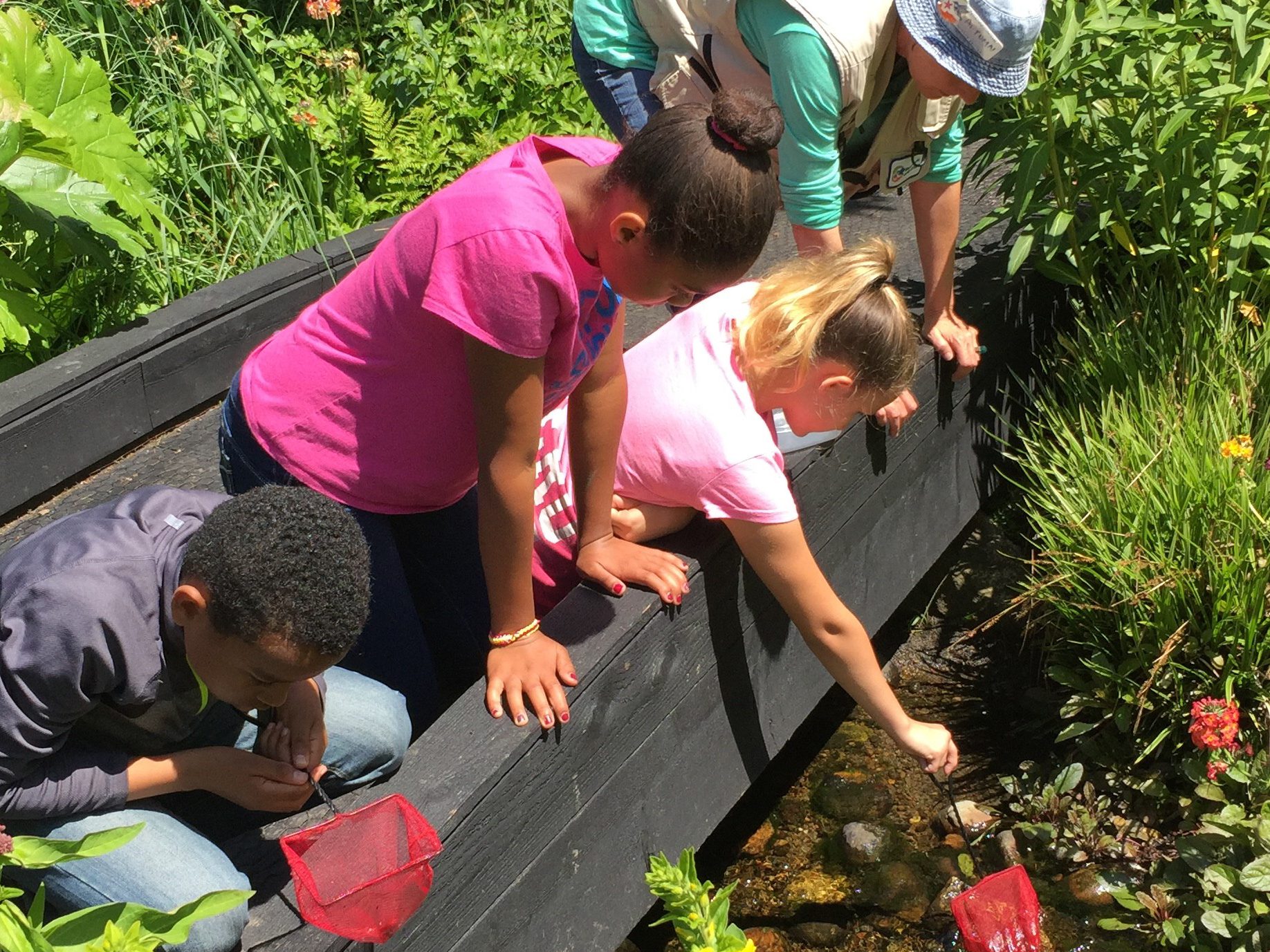These social media channels regularly promote CPO science and events, as well as Climate.gov publications.
Education
The Climate Education Program focuses on advancing public climate literacy in partnership with formal and informal educators by incorporating climate data, tools, and information products into classrooms and free-choice learning institutions; equipping educators with well-vetted, standards-based climate and energy lessons, multimedia resources, and visualizations and professional development opportunities; and defining “climate literacy” and helping to establish benchmarks of excellence to help guide educators.
The Climate Education Program supports the United Nations Framework Convention on Climate Change quadrennial reporting requirement on Article 6 or Action for Climate Empowerment. The program supported the 2006 and led the 2010 and 2014 U.S. Climate Action Reports.
The Essential Principles of Climate Literacy
Climate Literacy: The Essential Principles of Climate Science (2009) presents information that is deemed important for individuals and communities to know and understand about Earth’s climate, impacts of climate change, and approaches to adaptation or mitigation. Principles in the guide can serve as discussion starters or launching points for scientific inquiry. The guide aims to promote greater climate science literacy by providing this educational framework of principles and concepts.
Climate Literacy: The Essential Principles of Climate Sciences guide is now available in both English and Spanish.
What Is “Climate Literacy” and Why Is It Important?
Scientific and education experts define climate literacy as “the matrix of knowledge people need to understand enough about Earth’s climate system to address climate-related issues.” A climate-literate person understands how climate affects their life and livelihood, and how humans influence the climate system. A climate-literate person knows where and how to find and use climate data and information to manage climate-related risks and opportunities they face; and they know how to distinguish credible from non-credible sources of information
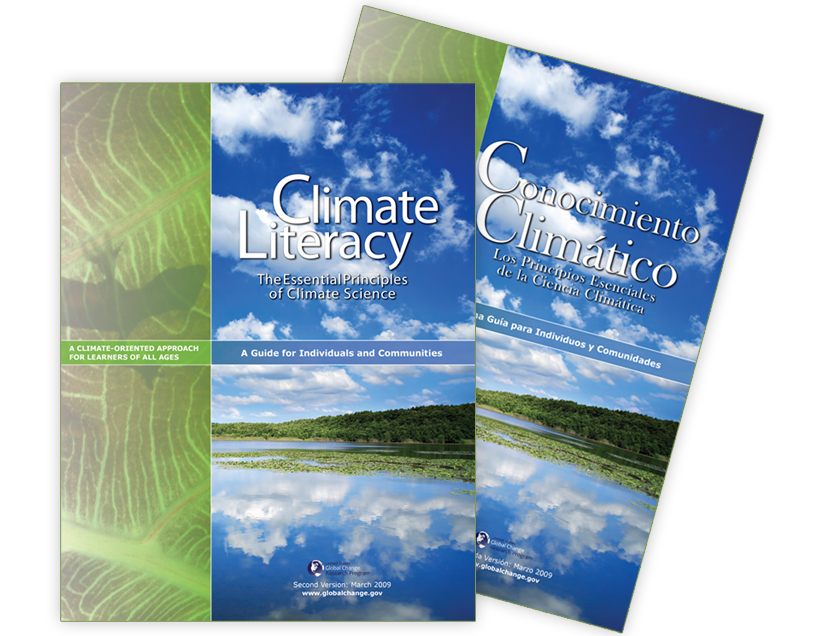
English Language:
High (15.51MB) Resolution pdf | Low (3.45MB) Resolucion pdf | Word (780kb).
En Español: Un Enfoque Climático Para Todas Las Edades
Alta (15.5MB) Resolutión pdf | Baja (3.40MB) Resolutión pdf | Word (728kb).
Formal Education
Climate.gov: Teaching Climate
NOAA Climate.gov’s Teaching Climate section offers reviewed learning activities and curriculum materials, multimedia resources, and professional development opportunities for formal and informal educators who want to incorporate climate science and related resources into their work.
The Teaching Climate section partnered with the Climate Literacy and Energy Awareness Network (CLEAN) to use the Climate Literacy guide to identify and integrate effective resources across different educational levels. The CLEAN framework for vetting, reviewing, and assuring scientific quality of climate and global change education materials on climate, energy, and related topics will be very useful to teachers and educational systems across the nation.


The CLEAN Network is professionally diverse and includes educators and learners, resource developers, scientists, education administrators, project partners, and the youth leaders. The CLEAN Network includes individuals that represent a wide range of professionals and citizens who are stakeholders in improving climate and energy literacy. Announcements of CLEAN activities are made through the CLEAN Facebook page, the CLEAN Network listserv and weekly webinars, and the CLEAN announcements listserv for educators.
Toolbox for Teaching Climate & Energy
Teachers across the country are preparing to teach the science and engineering called for in the new standards designed to address major world challenges and opportunities. Students will face issues, such as generating sufficient clean energy, building climate resilience for businesses and communities, maintaining supplies of food and clean water, and solving the problems of global environmental change that confront society today and in their future. The amount of time teachers are spending on these issues is going up significantly.
NOAA Climate.gov and a community of educational and science partners have developed and organized supporting resources and programs for those who want to teach climate and energy science, backed by some of the nation’s most experienced professional educators, scientists, and engineers. The Climate Action Learning Process (CALP) provides a path teachers can follow to educate students about climate and energy science, develop the skills to take action, and then reevaluate teaching methods. Explore the Toolbox for Teaching Climate & Energy.
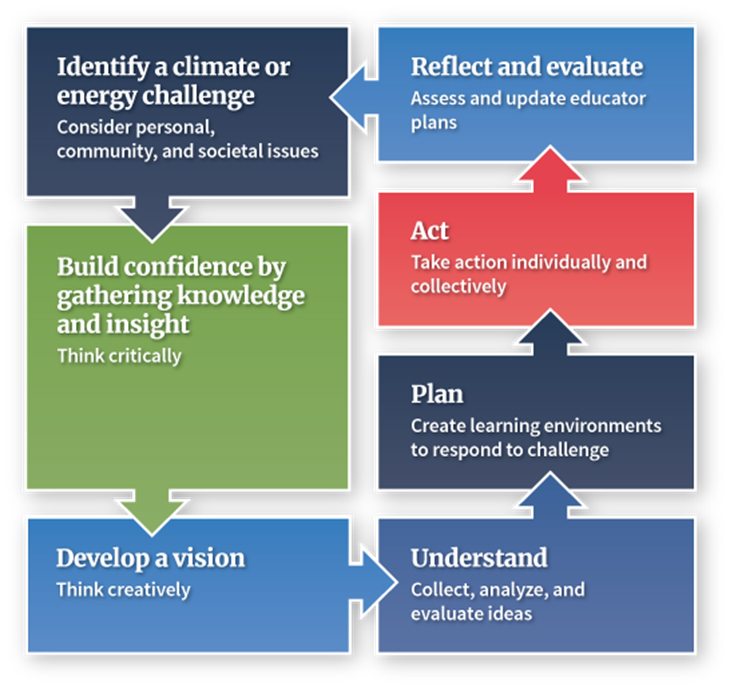

Informal Education
The CEE Division maintains strong partnerships with many scientific professional societies, informal educational institutions, and organizations with connections to climate. It attends their conferences and dialogues, shares new publications, presents on relevant topics, and builds fellowship.
The CEE Division regularly attends the National Adaptation Forum and the UNFCCC Conference of Parties (COP). At prior COP events, our team has facilitated the U.S. Center and supported side events.
Our team also attends meetings of other organizations such as the American Geophysical Union, the American Meteorological Society, the National Science Teaching Association, the Association of Science and Technology Centers, the American Association for the Advancement of Science, and the North American Association for Environmental Education.
Student and Early Career Opportunities
The Climate Program Office is committed to ensuring that the next generation of scientists and researchers is not only highly skilled but also reflects the diversity from which America derives its many strengths. In fulfillment of its education and workforce development goals, CPO provides educational opportunities in a broad range of topical areas related to its climate mission, including climate modeling and prediction, earth system science, atmospheric chemistry, Arctic research and monitoring, water resources and drought, heat health, marine ecosystems, climate and fisheries, communication and engagement, and social science. Through their experience in CPO, student interns and early career professionals gain a better understanding of climate research and of the impacts of climate change on ecosystems, communities and economies. Similarly, CPO gains the perspectives of fresh ideas and broad experiences from a wide range of backgrounds and educational levels from high school to PhD.
Internships and Fellowships
William M. Lapenta Student Internship Program
Ernest F. Hollings Undergraduate Scholarship Program
Educational Partnership Program with Minority Serving Institutions
John A. Knauss Marine Policy Fellowship
CPO also provides direct support to:
Significant Opportunities in Atmospheric Research & Science (SOARS) (4 undergraduate/graduate students per year)
American Meteorological Society Fellowships (2 Fellows per year)
If you would like to intern in the Climate Program Office but are not affiliated with one of the above programs, we also host student interns on an ad hoc basis (unpaid). Please contact Todd Christenson (todd.christenson@noaa.gov) for information.
Climate & Global Change (C&GC) Postdoctoral Program
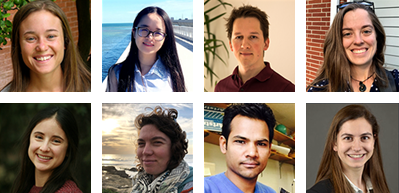

The purpose of the program is to help create and train the next generation of leading researchers needed for climate studies. The fellowship program has developed an outstanding reputation of attracting the best and the brightest PhDs in the sciences relevant to the CPO. Application information can be found on the How Postdocs Apply page, information on current awardees and alumni can be found here, and information on the program’s history, biographical information on select alumni, and alumni testimonials can be found here.
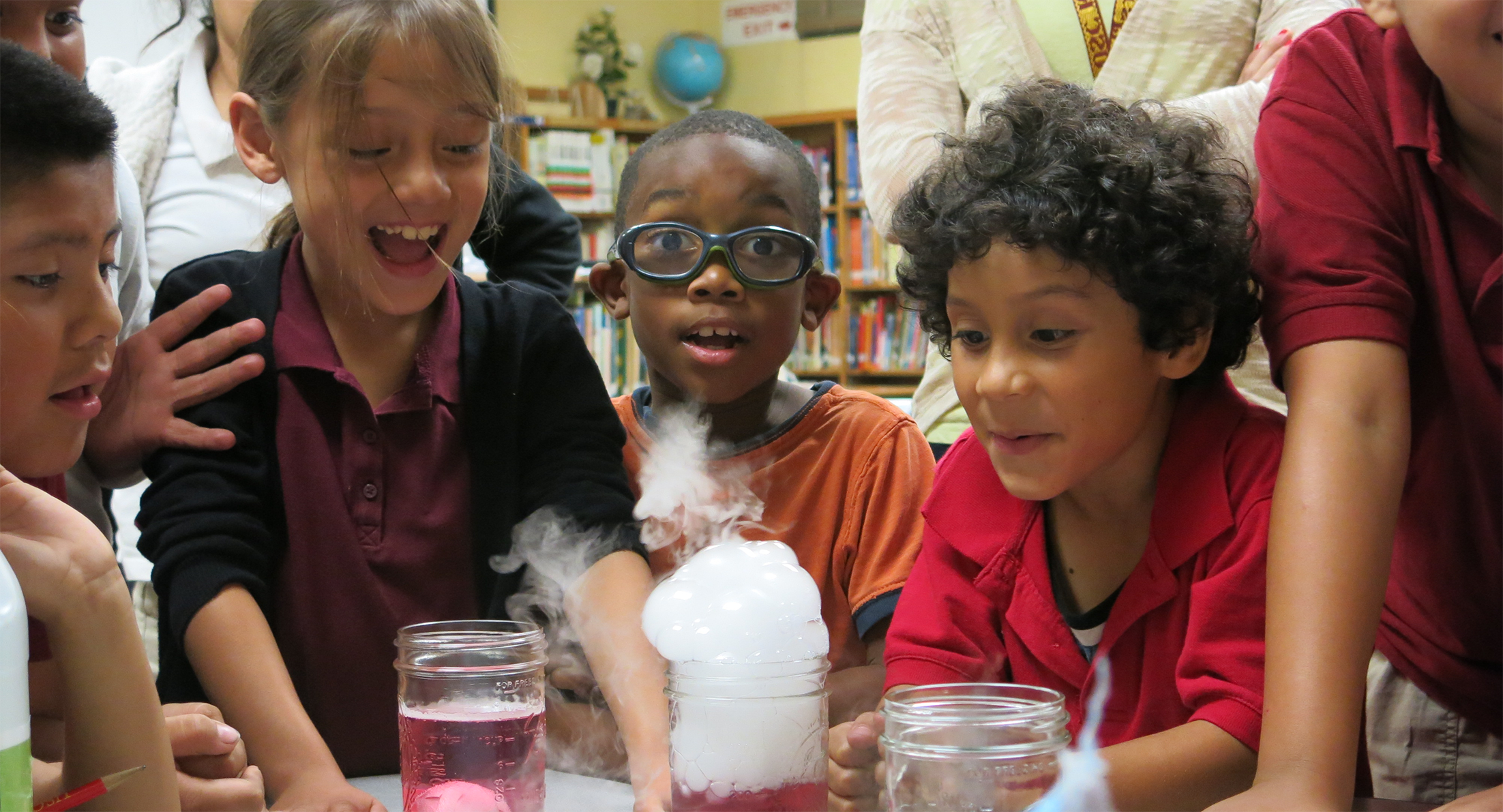

Science on a Sphere
CEE partners with NOAA’s Office of Education to help develop and promote content on NOAA’s Science on a Sphere. This includes providing consultation to science educators and communicators from museums and other informal education centers in the development of climate-related talks using the Sphere, the development of climate datasets for the Sphere, as well as serving as the point of contact for any climate/weather related needs on the open to the public Science on a Sphere located at NOAA Headquarters in Silver Spring, MD.


Ocean Today
Ocean Today is an exciting, multimedia kiosk that features videos on all aspects of the ocean realm -- exploration and discoveries, marine life and science. It was originally designed for the Sant Ocean Hall in the Smithsonian Institution’s National Museum of Natural History which opened in September 2008. Due to the popularity of the videos, Ocean Today kiosks are now located in dozens of aquariums, museums, and learning centers throughout the world.
Education Partnerships
CEE’s Education Program deepens its impact through collaborations. NOAA Office of Education has been a long standing partner for the Climate Program Office. Collaborations with the Environmental Literacy Program have advanced climate change education through the Tri-Agency Climate Education (TrACE) Collaborative. Since 2015, NOAA’s Environmental Literacy Grants (ELG) competitions have funded science education projects that educate and inspire people and their communities to use Earth system science to become more resilient to local weather and climate hazards. They build resilience by mitigating vulnerabilities to the effects of severe weather and adapting to the effects of climate change.
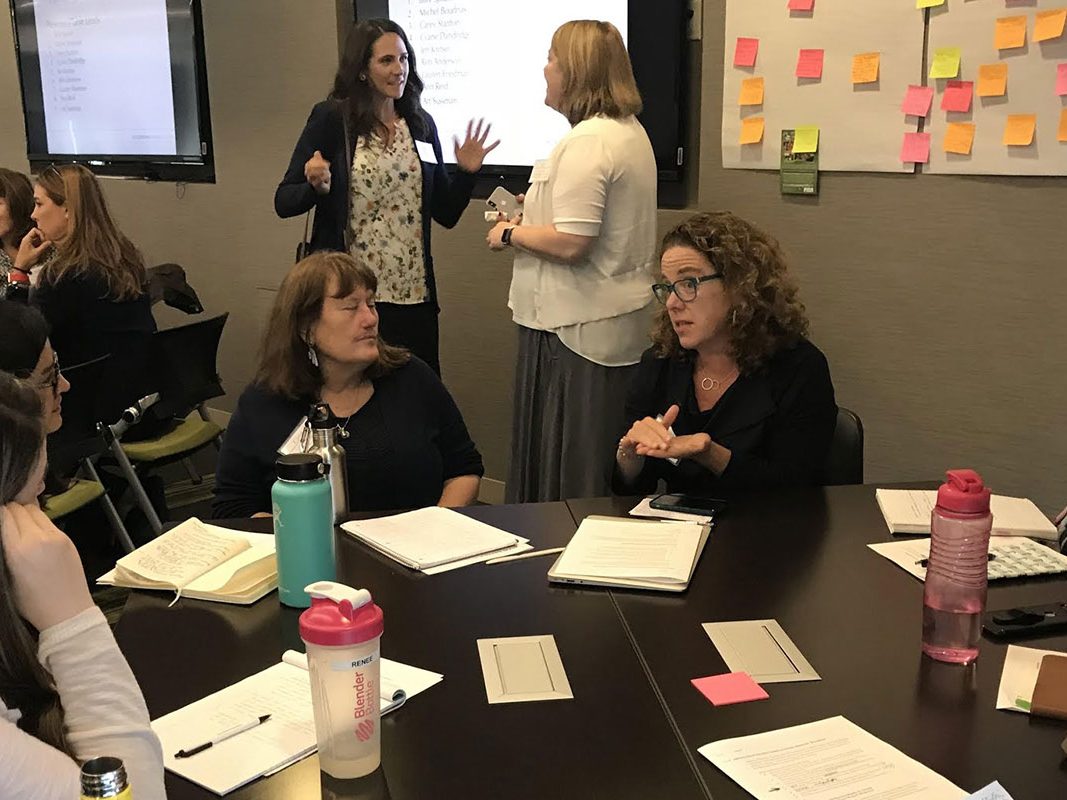

Current grant-funded partnerships include:
Center For Climate Change Communication (4C) at George Mason University
The Center For Climate Change Communication develops and applies social science insights to help society make informed decisions that will stabilize the earth’s life-sustaining climate, and prevent further harm from climate change. We partner with the center on the Climate Matters program which has been helping TV weathercasters and journalists report local climate change stories since 2009.
Climate Central
Climate Central is an independent organization of leading scientists and journalists researching and reporting the facts about our changing climate and its impact on the public. We partner with the center on the Climate Matters program which has been helping TV weathercasters and journalists report local climate change stories since 2009.
Resilient Schools Consortium (RiSC) Program
Research Foundation of CUNY / Brooklyn College
Working with NWF Eco-Schools USA, will create The Resilient Schools Consortium (RiSC) Program, which increases environmental literacy while engaging high school and middle school students in climate resilience planning and practice in New York City. The City’s long-term planning document, OneNYC, sets forth a vision for a resilient city without specifying a role for students or including specific plans for their schools. This project addresses this gap by developing resilience plans for NYC schools and including student voices in the process.
Community Partnership for Resilience
New England Aquarium Corporation / New England Aquarium (NEAq) · Boston, Massachusetts
The New England Aquarium will work with the Metropolitan Area Planning Council to establish Community Partnerships for Resilience (CPR), which will create community partnerships in three Boston-area communities that face severe risk from a changing climate – Chelsea, Hull, and Lynn, Massachusetts. CPR will facilitate “Community Teams” of local professionals with diverse and relevant expertise in climate science, engineering, community planning and community action, and representatives from local schools or school-based educational programs serving youth in grades 4 through 8.
AMS/NOAA Cooperative Program for Earth System Education (CPESE)
American Meteorological Society (AMS) · Boston, Massachusetts
The American Meteorological Society (AMS) and National Oceanic and Atmospheric Administration (NOAA) work together to share knowledge and information about weather and climate, ocean, and coasts with educators and students across the country. The goal of this effort is to build a scientifically informed and engaged society and a diverse STEM workforce prepared to respond to environmental hazards.
Empowering Rural Youth for Community Climate Resilience in New York State
Natural History Museum of the Adirondacks / The Wild Center · Tupper Lake, New York
Empowering Rural Youth for Community Climate Resilience in New York State is a three-year project led by The Wild Center in partnership with the Finger Lakes Institute at Hobart and William Smith College and the Alliance for Climate Education, which builds on the achievements of Convening Young Leaders for Climate Resilience, a project previously funded by NOAA. Today’s youth are deeply concerned about the impacts of climate change in their communities and increasingly demand positive action and a role in decision-making.
Convening Young Leaders for Climate Resilience in New York State
Natural History Museum of the Adirondacks / The Wild Center · Tupper Lake, New York
The Wild Center’s Convening Young Leaders for Climate Resilience in New York State project will increase climate literacy among high school students and teachers in New York City, the Catskill, and the Adirondacks, and give students the leadership skills to help their communities respond to the impacts of climate change.
Climate Resilience and Community-Driven Action with a Hyper-Localized Public Forum
Science Museum of Virginia Foundation / Science Museum of Virginia · Richmond, Virginia
The Science Museum of Virginia will build upon its community science experience and its role as a trusted source of climate science information to lead “Climate Resilience and Community-Driven Action with a Hyperlocalized Public Forum in Richmond, VA” in partnership with Virginia Community Voice, Groundwork RVA, Happily Natural Day, and Southside ReLeaf — local nonprofits with proven track records of effecting change through community engagement and urban greening initiatives.
Citizen Science, Civics, and Resilient Communities (CSCRC)
Museum of Science Boston · Boston, Massachusetts
The “Citizen Science, Civics, and Resilient Communities” education project, led by the Museum of Science, Boston in partnership with Arizona State University and Northeastern University, will increase resilience to extreme weather and environmental hazards through citizen-created data, local knowledge, and community values.
HEARTForce: Hazard Education, Awareness & Resilience Taskforce
University of Colorado Boulder / Cooperative Institute for Research in Environmental Sciences (CIRES) · Boulder, Colorado
Communities in Colorado are increasingly experiencing major disruptions from environmental hazards, such as fire, flood, drought and extreme heat. With this rise in hazardous events, there is a pressing need for communities to build resilience. An interdisciplinary team from the Cooperative Institute for Research in Environmental Sciences (CIRES) Education & Outreach Program at the University of Colorado at Boulder is developing and implementing an innovative, action-oriented youth engagement project targeting rural Colorado students, teachers and communities.
NOAA Office of Education
The Office of Education works to advance education both within NOAA and with the public we both serve. They provide scholarships and collaborate with universities to prepare the brightest minds from diverse backgrounds in NOAA-related fields. They offer competitive grants and establish partnerships to integrate NOAA science into schools and organizations. Lastly, they help coordinate educational activities across NOAA and with external partners to ensure that these efforts are effective and continually improved.
CIRES Education and Outreach
University of Colorado Boulder / Cooperative Institute for Research in Environmental Sciences (CIRES) · Boulder, Colorado
The Education and Outreach program at CIRES is the go-between that helps to make cutting-edge research accessible to students, teachers, and the public. CIRES stands for the Cooperative Institute for Research in Environmental Sciences. CIRES Education & Outreach promotes and strengthens scientific and environmental literacy by engaging communities in our project work, and inspires and prepares the next generation of STEM researchers in careers towards building a sustainable future. CIRES Education and Outreach are the leads for the CLEAN Portal, the CLEAN Collection and teacher support pages.
Science Education Resource Center (SERC)
Science Education Resource Center is a grant-funded office at Carleton College, founded to improve education in the Earth sciences and beyond. Today they are a team of 14 educators, researchers and technical specialists who have worked with over 100 award winning education projects across the STEM disciplines and allied fields. Engaging participants from more than 1,000 institutions of higher education, as well as K-12 curriculum developers and teachers, they have created one of the world’s largest collections of pedagogic resources. SERC provides the educational infrastructure for the CLEAN Portal, the CLEAN Collection and teacher support pages.
U.S. Global Change Research Program
The U.S. Global Change Research Program (USGCRP) is a federal program mandated by Congress to coordinate federal research and investments in understanding the forces shaping the global environment, both human and natural, and their impacts on society. USGCRP facilitates collaboration and cooperation across its 13 federal member agencies to advance understanding of the changing Earth system and maximize efficiencies in federal global change research. The Climate Education Interagency Working Group is led by NOAA in partnership with USGCRP.
Climate Literacy and Energy Awareness Network (CLEAN Network)
The CLEAN Network is professionally diverse and includes educators and learners, resource developers, project partners, and the CLEAN Network. The CLEAN Network includes individuals that represent a wide range of professionals and citizens who are stakeholders in improving climate and energy literacy. Announcements of CLEAN activities are made through the CLEAN Facebook page, the CLEAN Network listserv and teleconferences, and the CLEAN announcements listserv for educators.
Climate Generation: A Will Steger Legacy
Climate Generation: A Will Steger Legacy empowers individuals and their communities to engage in solutions to climate change. They believe educating is a tool of empowerment and that empowering educators as critical messengers of climate and energy literacy is part of the solution to climate change. We partner with them on the Summer Institute for Climate Change Education , new curriculum, professional development opportunities, and strategic initiatives of the CLEAN Network.
Alliance for Climate Education
Alliance for Climate Education, or ACE, is a 5013 nonprofit that provides educational resources on climate science and justice, as well training for young climate leaders. Since 2008, ACE has reached more than 2,000,000 students nationwide. We partner with them on the Our Climate Our Future program, an award-winning, interactive climate education resource that brings climate change and solutionsto life and strategic initiatives of the CLEAN Network.
The Wild Center
The Wild Center, in the Adirondack Park of New York State, is science-based, and its experiences, exhibits and programs are designed to open new ways to look into our relationship with nature. We partner with the Wild Center on their Youth Climate Program to convene, engage, connect and empower young people around the world for action on climate change and strategic initiatives of the CLEAN Network.
American Meteorological Society (AMS) Education
AMS offers a wide variety of resources, materials, and programs for K–12 educators as well as faculty at undergraduate institutions. AMS provides course materials, in-classroom resources, educator instruction, and specialized training for educators in weather, water, and climate sciences.We partner with AMS Education on the DataStreme Program, Climate Studies program, and strategic initiatives of the CLEAN Network.
University of Washington College of Education: Institute of Science and Math Education
Since 2008, the University of Washington Institute for Science and Mathematics Education has created partnerships to envision, cultivate, and study equity-focused educational models and practices in STEM education. They do this work across the K- 12 grade span and in formal and informal learning environments. We partner with the institute on the ClimeTime initiative, a Washington State grant funded program supporting science teacher training linking Next Generation Science Standards (NGSS) and climate science. We also partner on and strategic initiatives of the CLEAN Network.
Climate Educational Reports
The NOAA Climate Program Office’s Climate Education Program currently monitors climate education, engagement, and workforce development and training activities in the United States.
In the summer of 2021, the NOAA Climate Program Office undertook the first phase of a project to inventory relevant programs and FY22 plans across federal departments and agencies. The inventory focused specifically on federal programs designed to increase public knowledge and awareness and build the capacity of communities, organizations, and subnational and Tribal governments to mount effective community responses to the climate crisis in just and equitable ways.
Inventory of Federal Climate Engagement and Capacity-building Programs
Author: Climate Program Office (CPO) | Education Department
Published: January 2023
Analysis of a Phase I Inventory of Federal Climate Education, Engagement, Workforce Development and Training Programs
Author: Climate Program Office (CPO)
Published: February 2022
